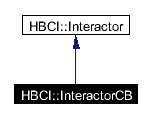
#include <interactorcb.h>
Inheritance diagram for HBCI::InteractorCB:

Public Methods | |
| InteractorCB (VoidFuncTyp destrCB, InputPinFuncTyp msgInputPinCB, InputUserFuncTyp msgInsertMediumOrAbortCB, InputUserFuncTyp msgInsertCorrectMediumOrAbortCB, LoggingFuncTyp msgStateResponseCB, BoolFuncTyp keepAliveCB, VoidUserFuncTyp msgStartInputPinViaKeypadCB, VoidUserFuncTyp msgFinishedInputPinViaKeypadCB, void *user_data) | |
| ~InteractorCB () | |
| bool | msgInputPin (Pointer< User > user, string &pin, int minsize, bool newPin) |
| bool | msgInsertMediumOrAbort (Pointer< User > user, MediumType t) |
| bool | msgInsertCorrectMediumOrAbort (Pointer< User > user, MediumType t) |
| void | msgStateResponse (const string &msg) |
| bool | keepAlive () |
| virtual void | msgStartInputPinViaKeypad (Pointer< User > user) |
| virtual void | msgFinishedInputPinViaKeypad (Pointer< User > user) |
This class defines methods for all occasions where the core OpenHBCI needs user interaction, as layouted through the Interactor interface.
This is an implementation which stores function pointers (callbacks) for each interaction method and calls them for each method defined in the base class. If there hasn't been set any of the correct callbacks, then the default implementation of the base class is called.
|
||||||||||||||||||||||||||||||||||||||||
|
Constructor. Any of these function callbacks are allowed to be zero, in which case the default implementation of HBCI::Interactor is called. user_data is a pointer to arbitrary data that is going to be passed on to each callback function. |
|
|
Destructor. This will call the destrCB callbank function before actually deleting this object. Use the destrCB to e.g. delete the data pointed to by user_data. |
|
|
During actions which take a long time to perform (some seconds or minutes) this method is called by OpenHBCI every once in a while. You can override this method to let your program do some GUI update stuff. Also, if this method returns "false", then the long term action will be aborted. Otherwise the action simply continues. The default implementation of the InteractorCB returns the variable set by abort() which is accessible also by aborted(). Thus the InteractorCB offery you the convenience of only using abort() instead of deriving your own InteractorCB. If you overload this method, you probably should take the value of aborted() into account to comply to that default behaviour.
Reimplemented from HBCI::Interactor. |
|
|
This method is called directly after the secure pin verification (via the card readers keypad) is finished. A graphical applicatition most likely closes the notification window opened at msgStartInputPinViaKeypad(). (new since 0.9.5)
Reimplemented from HBCI::Interactor. |
|
||||||||||||||||||||
|
Ask the user for the pin of a security medium. This method is called by the default Authentifikator. The default implementation does nothing and returns false.
Reimplemented from HBCI::Interactor. |
|
||||||||||||
|
Tell the user that:
Reimplemented from HBCI::Interactor. |
|
||||||||||||
|
Tell the user to insert a chip card. The default implementation does nothing and returns false.
Reimplemented from HBCI::Interactor. |
|
|
This method is called directly before the user is supposed to enter the pin into the keypad of a card reader. This is used to inform the user that OpenHBCI started secure pin verification. A graphical application might want to open a window that tells the user about this. (new since 0.9.5)
Reimplemented from HBCI::Interactor. |
|
|
Prints a message that might be used for logging purpose. Does not require interaction. The default implementation does nothing and discards the message. This method should be overwritten by your application.
Reimplemented from HBCI::Interactor. |
 1.2.17
1.2.17